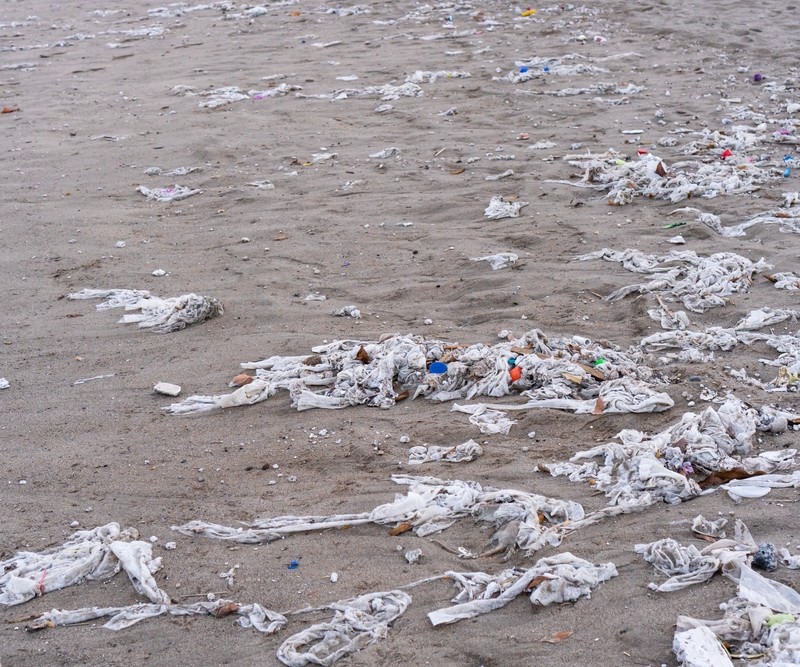‘Wet wipe island’ in the Thames prompts new calls for plastic wet wipe ban

The harmful impact of wet wipes on our environment and drains has been pushed back into the spotlight by the emergence of an unpleasant mass of wet wipes on the banks of London’s famous River Thames.
This “wet wipe island” has formed near Hammersmith over the course of several months and years, and has now become so large as to attract the attention of the national media – as well as government lawmakers.
As such, this unhygienic mass has prompted renewed calls for a total ban on wet wipes containing plastic. Get the facts from the drainage experts at Lanes Group, and find out more about what may need to be done about this growing problem.
What is the ‘wet wipe island’?
The so-called ‘wet wipe island’ is located on the bank of the Thames near Barnes, in close proximity to Hammersmith Bridge. This huge mound is composed primarily of wet wipes that have been wrongly discarded down the drain or into sewers, and have now found their way into the Thames, clumping together to form a mass that is a metre deep or more in certain places.
Having grown steadily in size, the ‘wet wipe island’ is estimated to be roughly the size of two tennis courts – and is big enough to have changed the course of the Thames.
The emergence of this wet wipe behemoth has caught the attention of the national media, with the Times, the Telegraph, the Evening Standard, the Independent, Sky News and LBC among the organisations who have covered the news. It has also added further impetus to parliamentary calls for a total ban on all future production of wet wipes containing plastic, a move that Lanes Group has consistently supported.
Fleur Anderson, the Labour MP for Putney who is spearheading the proposed bill to ban plastic wet wipes, has spoken out in the House of Commons about her experience of visiting and standing on the ‘wet wipe island’, pointing to it as a prime example of the environmental damage that her bill seeks to address.
She said of wet wipes: “There’s a lack of awareness that flushing them down, they don’t disintegrate, they do stay in the system for a long time. They do go out to the sea, they go on the banks of the Thames. There are 30,000 blockages a year because of wet wipes … that costs us money in our water bills.”
In response, environment minister Rebecca Pow echoed the importance of making sure that wet wipes are being properly disposed of, saying: “What I would say to everybody is if you don’t need to use a wet wipe, don’t, but also don’t chuck them down the loo.”
The view from Lanes Group
Lanes Group believes that the emergence of this ‘wet wipe island’ in the Thames is an illustration of the key messages the company has been communicating about the need for better education on good drainage practices, as well as the value of stronger environmental laws surrounding wet wipes.
Jacob Larkin, marketing coordinator at Lanes Group, has this to say:
“The ‘wet wipe island’ that has recently created problems in the Thames should draw everyone’s attention to the ways in which we neglect our environment. It should be a warning for all of us to think and act differently.
“The problem seems to have been caused by people disposing of wet wipes by flushing them away. Many people do not realise that wet wipes contain a large volume of hidden plastic and that, therefore, they shouldn’t be flushed away. In some cases, wet wipes could take 500 years to properly break down.
“Even when wet wipes are labelled as flushable, they may be incorrectly labelled or still cause problems if flushed away in large quantities, so we suggest that people always dispose of wipes and other similar products (like wet wipes, sanitary products and condoms) in bins.
“Unfortunately, people haven’t received the message. In research we carried out last year, 39% of respondents reported flushing wet wipes away, and 31% admitted to flushing away tampons. At Lanes, we founded the Unblocktober campaign to encourage people to take better care of their drains, and while the campaign has been successful, we will still be at risk of more wet wipe islands from forming in our waterways unless people adopt better habits.
“Disposing of plastic products in the bin is not only more environmentally sound, but better for household drainage systems, so there are benefits for everyone in taking more care with what we flush away. Products containing plastics can accumulate and form fatbergs, which are also an expensive and inconvenient problem to deal with. They can block drains or even sewers if they become large enough, and the wet wipe island appears to be a type of fatberg.
“Lanes Group’s drainage engineers spend a lot of time in the sewers and have seen first-hand the impact that improperly discarded wet wipes and fatbergs can cause. We helped to remove the Whitechapel fatberg in 2017, which was over 250m in length and weighed over 130 tonnes. Things haven’t improved since then, and we expect to see bigger fatbergs and more wet wipe islands in the future.
“We can only avoid these problems in future by reducing how much plastic we use, and taking more care in how we dispose of these products so that they don’t end up in our environment.”
Find out more
To find out more about the issues surrounding wet wipes and the environment, take a look at the following resources
- Our Unblocktober homepage, which shows how you can get involved in promoting better drainage habits across the UK
- Our information page explaining why you shouldn’t flush wet wipes
- Our latest drainage habits survey, which shows just how often people in the UK are still flushing wet wipes down the drain
- Our Hidden Plastics factfile, which demonstrates the environmental impact of plastic-containing wet wipes and other domestic products
- Our educational resources for primary schools and secondary schools, for teaching children about how to minimise the impact of drainage pollution
- Our media contact details, for more information about our work highlighting the environmental impact of wet wipe and hidden plastic pollution on our drains
If you are experiencing a blockage caused by wet wipes or any other issue, get in touch with Lanes today. Find out more about our drain unblocking services, or call us 24/7 on 0800 526 488.







